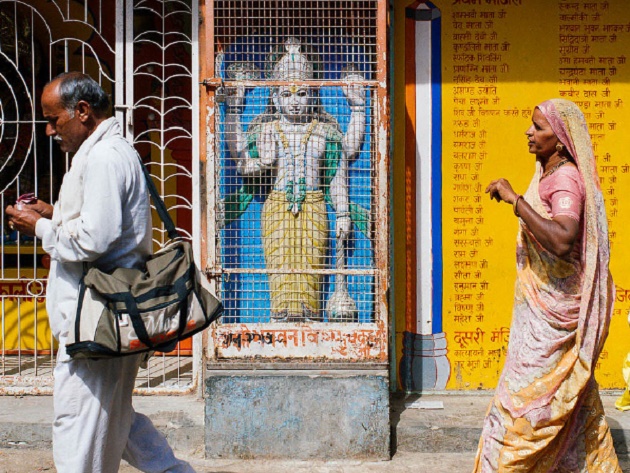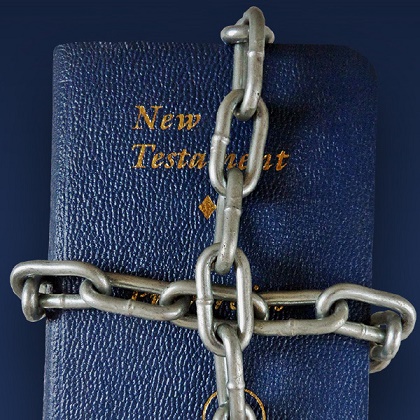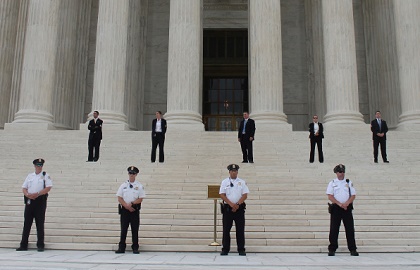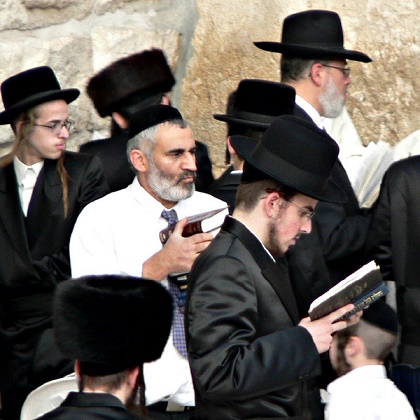An evangelical emphasis on nurturing societies that encourage openness, tolerance, and diversity of religious expression should be seen as a benefit to all citizens and beneficial to mission and ministry globally.
 Photo: Matt McDermott (CC BY NC ND 2.0)
Photo: Matt McDermott (CC BY NC ND 2.0)
According to the Pew Report on The Future of World Religions: Population Growth Projections, 2010-2050,[i] North America and Western Europe are becoming increasingly secular with major declines in church attendance, even as Christianity and Islam rise in the Global South and East. With this intensification and polarisation of religions and irreligion globally has come political pressure upon governments to embrace a religious or secular national ideology.
Growing intolerance
A second Pew report Latest Trends in Religious Restrictions and Hostilities documents a concomitant increase of official intolerance and restriction of minority religious faiths from 20% of governments putting in place ‘high or very high level restrictions on religion’ in 2007 to 27% in 2013.[ii] Although the 2015 report marked a slight decline from 2014, this slight dip does little to lessen the report’s conclusion that social hostility, abuse, and violence toward minority faiths are at unprecedented levels.[iii]
The report notes that official intolerance, legal sanction, harassment, and outright persecution of minority religious communities are far more likely in countries where one religion or ideology dominates socially and politically. According to the three measures the Pew report used to identify social hostility to religious minorities, religious minorities in 120 countries (61% of all nations) suffered at least one of these hostilities: imposition of one religious or non-religious ideology; attempts to prevent minority faiths from worshipping; and actual attacks directed at persons, institutions, and places of worship perceived to threaten the majority religious faith or secular ideology.
Although the worst abuses of religious minorities take place in single-party states where one religion or political ideology dominates, the Pew report documents the growing intolerance of minority faiths in secular and purportedly liberal Europe. According to the report, Europe has witnessed the largest increase in median level government restriction on religion.[iv]
Thus, religious and secular intolerance of minority religious expression are not limited to religious states, but are manifest in 39% of all nations, with some 5.5 billion people now living in countries with high or very high levels of restrictions upon religion—or 77% of the world’s population: up from 74% in 2011.[v]
Why is it happening?
The common denominator in official sanction of religious minorities is not simply a matter of religion per se. State discrimination, legal restriction, social hostility, and outright violence against religious minorities have risen in nations as ideologically and religiously diverse as China, Saudi Arabia, North Korea, Burma, Vietnam, Sudan, and Pakistan.
 Photo: Images Cristas (CC BY NC 2.0)
Photo: Images Cristas (CC BY NC 2.0)What appears to be the inner logic that justifies discrimination against, and outright abuse of, religious minorities has much to do with national identity and ideology, whether or not that is secular or religious. In states where religious or ideological exclusivity is enforced, questioning the prevailing religious or ideological identity is often seen as potentially subversive. The assumed superiority of the ruling belief system leads to a questioning of motives behind any alternative religious or ideological framework that puts into question the religious or ideological pillars of the state.
The fact that democratic regimes have proven far more tolerant of religious diversity than non-democratic regimes has much to do with their self-identification as nations which defend religious diversity, freedom of conscience, democratic political engagement, and freedom of speech. Thus government sanctions against religious minorities are a good indicator of whether governments are likely to restrict other human rights as well.
Why is it important?
With Christianity growing rapidly in the Global South and East, much of this growth is occurring in nations where Christianity is a distinct minority. This growth is being met with greater restrictions and growing hostility toward Christian mission and evangelism. As religious and ideological exclusivity grow, so will greater restrictions upon mission work as well as social hostility and even violence against missionaries and their converts.
India and Israel are representative of these trends:
India
Since the election of Narendra Modi of the Hindu Bharatiya Janata Party as prime minister in 2014, pressure has been building to amend the constitution to make India a Hindu state and calls have been growing for the re-conversion of Christians and Muslims back to Hinduism.[vi]
Israel
In modern secular Israel, recent demands by the ruling Likud and Orthodox Jewish parties that Israel be recognised as a ‘Jewish State’ as a condition for peace talks with Palestinians have raised serious concerns within Israel and internationally.
Indeed, emphasis upon religious national identity is viewed by non-Jewish citizens in Israel and non-Hindus in India as consignment to official second class status, thus putting in danger both nations’ democratic traditions and emphases upon human rights.[vii]
 Photo: Elvert Barnes (CC BY SA 2.0)
Photo: Elvert Barnes (CC BY SA 2.0)United States
As Europe and North America grow increasingly secular, many evangelicals and Roman Catholics are increasingly concerned with anti-Christian rhetoric and enforcement of new restrictions on religious liberty. The court ruling last year affirming gay marriage in the US has produced a legal hornet’s nest as legal actions against Christian institutions that discriminate in hiring based on their understanding of marriage and sexual ethics begin to mount.[viii] Given that there is legal precedent to strip academic institutions of their tax-exempt status if they discriminate against protected classes of persons, many such institutions fear they may be forced to either close or abandon their current codes of conduct in deference to a ‘new morality’ imposed by the state.
Moves to try to preserve the rights of Christian institutions are now currently making their way through the US Congress and state legislatures nationally, but their outcome is far from clear, given the power of the courts to rescind state law by judicial decision according to the legal precedent now in place.[ix] Although opposition to evangelical Christian perspectives in secular nations is couched in the language of tolerance and diversity, the result is increasing restriction upon evangelicals to order their lives and their institutions according to their traditions and conscience.
Longer-term outlook
In the long term, it appears that religious and ideological exclusivity, religious restrictions, social hostility, abuse, and even violence against Christianity around the globe will rise. Such restrictions, hostility, and abuse will reflect the differing religious and ideological frameworks that seek to marginalise the diverse perspectives that religious minorities represent.
Thus, it would not be surprising to see newly minted Christian majority nations without long histories of protecting the rights of minorities seeking to establish ‘Christian states’ that would restrict the rights of, and nurture social hostility against, religious minorities. For example, Angola, a Christian majority nation, has officially banned Islam and reportedly closed or destroyed some mosques in the country.[x]
The temptation legally to restrict minority religious and political competitors is great in all societies and within all religions. Nonetheless, such moves by religious and ideological majorities carry with them unintended consequences.
 Photo: Premasagar (CC BY NC 2.0)
Photo: Premasagar (CC BY NC 2.0)Because human rights are part of the complex web of rights that inform and strengthen civil society and democratic governance, restricting or showing hostility to one affects the others. Thus restricting the freedom of worship and assembly for minority faiths has a knock-on effect on other human rights such as freedom of speech, freedom of assembly, freedom of the press, and finally freedom of conscience.
Policy implications and suggested responses
For evangelical Christians, Christian institutions, and Christian missions, the rise of religious restriction, social hostility, and persecution of minority faiths is a matter of great concern.
Awareness of the tendency of restriction and some of the underlying causes of religious discrimination should serve to forewarn and forearm missions and ministry globally. An evangelical emphasis on nurturing societies that encourage openness, tolerance, and diversity of religious expression should be seen as a benefit to all citizens and beneficial to mission and ministry globally.
Hence it would be prudential for evangelicals to reach out to and establish strategic alliances with civil libertarians and groups advocating human rights—especially those arguing for freedom of religion and religious expression.
There has certainly been recognition of the role of vital Christian faith to the establishment of human rights. Nobel Prize winner, Liu Xiaobo, echoes the views of Alexander Solzhenitsyn and Vaclav Havel, in noting the link between the development of Christianity, vital spirituality, and the desire of people to ‘control their own souls’.[xi] As Liu notes, this vital spirituality ‘demonstrates a popular recognition of the fact that if people do not take the initiative to fight for their legally guaranteed freedoms of speech, assembly, and belief, they have no escape from a life of terror’.[xii]
In turn and in the face of growing secularist hostility to evangelical Christian views, Os Guinness and other concerned evangelicals in 2012 drew up for endorsement ‘The Global Charter of Conscience’[xiii] that seeks to address the two trends noted above: ‘the revitalization and growing political influence of religions with the danger of attempts to sustain the supremacy of one religion at the expense of others, and the spread of naturalistic worldviews, with the equal danger of excluding all religions from public life and thus favoring an exclusive form of non-religious worldview.’
Accordingly they express concern that ‘traditional settlements of religion and public life show signs of stress and need to be renegotiated.’[xiv]
Even more recently, evangelical leaders in 2015 established The Civilitas Group dedicated to promoting civility and fruitful dialogue across confessional and non-religious lines. Although only in embryonic form, such moves represent a new edge among evangelical leaders to reach out beyond the confines of the evangelical ghetto to promote civil society and greater understanding among people of different backgrounds and religious/political convictions.[xv]
There are deep wells of Christian tradition that can be tapped in this endeavour. Historically, emphasis upon ‘freedom of conscience’ developed within Protestantism with its insistence that ‘God alone is Lord of the Conscience’[xvi]—in other words what is necessary for human flourishing and wellbeing precedes laws drawn up by secular or religious officials. Accordingly, human conscience is ultimately subject to God and not to human or religious ideology of any stripe.
Nonetheless, such an appeal requires a commitment to acknowledge and affirm the need for tolerance and diversity even when Christians represent a large majority of any civil population. The question is whether evangelical Christians and their secular antagonists are willing to re-appropriate that tolerance in an age of increasing hostility to minority religious expression globally.
Thomas Harvey is Academic Dean of the Oxford Centre for Mission Studies, Oxford, UK. From 1997-2008 he served as Senior Lecturer of Systematic Theology at Trinity Theological College in Singapore.
This article originally appeared in the March 2016 issue of the Lausanne Global Analysis and is published here with permission as part of the LGA Media Partnership. Learn more about this flagship publication from the Lausanne Movement at www.lausanne.org/lga.
[i] Pew Research Center, ‘The Future of World Religions: Population Growth Projections, 2010-2050: Why Muslims Are Rising Fastest and the Unaffiliated Are Shrinking as a Share of the World’s Population’, 2 April 2015, http://www.pewforum.org/2015/04/02/religious-projections-2010-2050.
[ii] Pew Research Center, ‘Latest Trends in Religious Restrictions and Hostilities: Overall Decline in Social Hostilities in 2013, Though Harassment of Jews Worldwide Reached a Seven-Year High’, 26 February 2015,
http://www.pewforum.org/2015/02/26/religious-hostilities/.
[iii] Editor’s Note: See article entitled ‘Persecution of Christians in the World Today’ by Charles Tieszen in the September 2013 issue of Lausanne Global Analysis.
[iv] Editor’s Note: See article entitled ‘The UK Campaign To End Religious Illiteracy’ by Jenny Taylor in the January 2015 issue of Lausanne Global Analysis.
[v] Pew Research Center, ‘Latest Trends in Religious Restrictions and Hostilities’, 26 February 2015.
[vi] Rupam Jain Nair and Frank Jack Danie, ‘Special Report: Battling for India's soul, state by state’, Reuters, 13 October 2015, http://in.reuters.com/article/india-rss-specialreport-idINKCN0S700420151013.
[vii] Jodi Rudoren, ‘Israel Struggles With Its Identity’, The New York Times, 8 December 2014, http://www.nytimes.com/2014/12/09/world/middleeast/israels-nationality-bill-stirs-debate-over-religious-and-democratic-identity.html. See also Victor Mallet, ‘Indian storm over minister’s comments on Muslims’, Financial Times, 16 October 2015, http://www.ft.com/cms/s/0/6ddc8e78-73d6-11e5-a129-3fcc4f641d98.html#axzz3w7AEgz4Z.
[viii] Michelle Boorstein, ‘2015 clarified the right to gay marriage. It opened a world of questions for religious objectors’, Washington Post, 31 December 2015, https://www.washingtonpost.com/news/acts-of-faith/wp/2015/12/31/2015-clarified-the-right-to-gay-marriage-it-opened-a-world-of-questions-for-religious-objectors/.
[ix] Laurie Goodstein and Adam Liptak, ‘Schools Fear Gay Marriage Ruling Could End Tax Exemptions’, The New York Times, 24 June 2015, http://www.nytimes.com/2015/06/25/us/schools-fear-impact-of-gay-marriage-ruling-on-tax-status.html.
[x] Ari Yashar, ‘Angola Becomes “First Country to Ban Islam”: Southern African nation reportedly bans Islam and orders the demolition of mosques in the country’, Arutz Sheva: Israelnewsonline.com, 25 November 2013, http://www.israelnationalnews.com/News/News.aspx/174445#.Vofp3vFgn1F.
[xi] Liu Xiaobo, ‘The Rise of Civil Society in China’, Seeds of Change, Issue no 3, 2011, http://www.hrichina.org/sites/default/files/PDFs/CRF.3.2003/Liu_Xiaobo.pdf. See also Alexander Solzhenitsyn’s commencement address at Harvard University, ‘A World Split Apart’, 8 June 1978, http://www.americanrhetoric.com/speeches/alexandersolzhenitsynharvard.htm. Also see Vaclav Havel, ‘Vaclav Havel's address to the US Congress, 21 February 1990’,
http://everything2.com/title/Vaclav+Havel%2527s+address+to+the+US+Congress%252C+21+February+1990.
[xiv] Editor’s Note: See article entitled ‘The Global Charter of Conscience’ by Os Guinness in the January 2013 issue of Lausanne Global Analysis.
[xv] See Richard Mouw’s address to The Civilitas Group at the Founders Dinner on 14 October 2015 based on his book Uncommon Decency: Christian Civility in an Uncivil World (Downers Grove: InterVarsity Press, 2010) online at https://vimeo.com/146061022.

Las opiniones vertidas por nuestros colaboradores se realizan a nivel personal, pudiendo coincidir o no con la postura de la dirección de Protestante Digital.
Si quieres comentar o